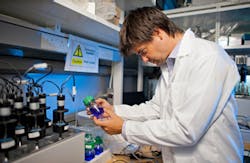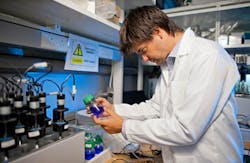Abu Dhabi researchers investigate use of wastewater for crop irrigation
New research in the United Arab Emirates is examining how treated wastewater can help the country make best use of its limited water resources.
Dr. Farrukh Ahmad and colleagues at the Masdar Institute of Science and Technology in Abu Dhabi are investigating the use of wastewater for irrigating edible crops — something that would reduce the need for desalinated water and help the country meet growing demands for water and food, while also reducing its energy consumption and carbon emissions.
"Agriculture accounts for nearly 60 percent of Abu Dhabi's water consumption. The use of treated effluent for irrigation could free-up Abu Dhabi's limited freshwater for our drinking and washing needs while providing more water for agriculture — enhancing both food and water security. Essentially, it could be a win-win situation," explained Dr. Ahmad, Associate Professor of Water and Environmental Engineering and project lead.
Desalination would continue to provide the majority of the UAE's freshwater for domestic use. But it is a costly and energy-intensive process, so it makes sense to consider alternative water sources.
Abu Dhabi already recycles some of its wastewater, with about 60 percent of its treated municipal wastewater used for landscape irrigation. Currently, the remainder is discharged to the Gulf because of limited irrigation distribution networks.
Before treated wastewater can be used for crop irrigation, however, the Masdar Institute scientists want to make sure it is properly treated so that it poses no health risks to consumers. They are developing methods for detecting disease-causing bacteria in the treated wastewater using next-generation DNA sequencing technology.
Tests have already been carried out on three vegetables frequently consumed uncooked — lettuce, cabbage and cucumber — to analyze the risk of disease if treated wastewater was used for their cultivation.
Of the three crops, lettuce showed the highest risk of infection. The results suggest that further investigation and advanced treatment might be required before treated wastewater can safely be used for edible crop agriculture.

